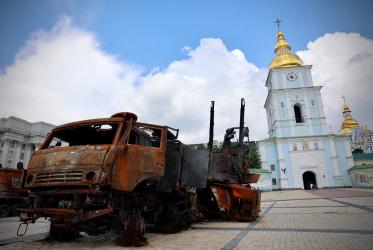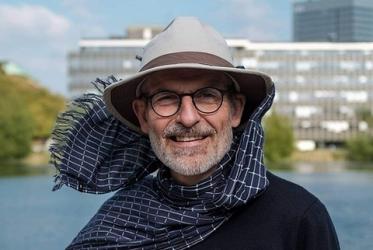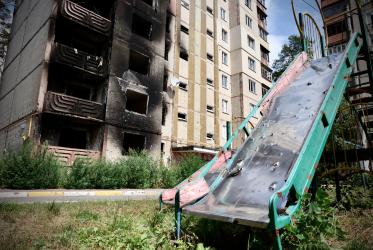Download the Russian version of the Communiqué (pdf, 115 KB)
A World Council of Churches (WCC) delegation led by the general secretary visited Ukraine from 17 to 20 March 2015. The delegation was comprised of high-level representatives from the global fellowship of churches represented in the WCC. From the beginning of the current crisis in Ukraine, the WCC has been concerned for the lives and livelihoods of all people affected.
The delegation sought to express solidarity with the churches and people of Ukraine in the context of the conflict in the eastern part of the country following the 2013-2014 Maidan events. Further, the delegation came to listen to the experiences and perspectives of the churches and other partners in Ukraine, and to discern ways in which the WCC and the ecumenical movement might be able to support and strengthen efforts by Ukrainian churches and faith communities to promote an end to conflict and a just peace and reconciliation in Ukraine. The visit was facilitated by the WCC’s member church in Ukraine, the Ukrainian Orthodox Church (Moscow Patriarchate), to whom we express our sincere appreciation.
During this visit, the delegation heard direct testimonies from church leaders and state representatives concerning the severe humanitarian impact of the violence in the affected regions. Delegation members had the opportunity to visit a displaced persons’ shelter in Kiev and were able to encounter people who had been obliged to flee from the fighting. Delegation members were also able to travel close to the conflict zone, near Lisichansk, and to witness for themselves the destruction and disruption resulting from the crisis. The delegation also heard of the central role being played by churches in providing humanitarian aid in the affected regions, though the unmet needs still remain very great. Collectively, these experiences have underlined the critical situation for the people and communities most directly affected, the urgent need to increase humanitarian assistance to them, and the necessity of resolving this conflict in order to prevent even worse human suffering.
During this visit, the delegation has heard different perspectives on the origins of the conflict. In any event, the delegation is convinced of the potential of the churches and faith communities of Ukraine to play a lead role in transcending the competing nationalisms that predispose groups toward conflict, in addressing the social, economic and humanitarian needs that have been compounded by the fighting, and in promoting unity and reconciliation among all people of Ukraine.
Two insights struck the delegation in particular:
- The Ukrainian Orthodox Church (UOC) has a key role to play in the search for peace, unity and reconciliation. As the majority church in Ukraine – with congregations in all parts of the country and on both sides of the line of conflict – and having officially declared and reiterated its commitment to the territorial integrity and unity of Ukraine, the UOC has a special capacity and leadership responsibility in this regard.
- The delegation also met with the All Ukrainian Council of Churches and Religious Organizations (AUCCRO) which encompasses almost every church tradition represented in Ukraine, as well as the Muslim and Jewish communities. The delegation stresses the importance of AUCCRO in the collective work of the churches and religious communities for a just and sustainable peace in Ukraine. The unified voice and witness of churches and religious communities – through AUCCRO – for peace and reconciliation in Ukraine has been and will continue to be greatly needed.
From all those encountered during these days, the delegation has heard a consistent call for the World Council of Churches and the ecumenical movement to inform the international community about the situation in Ukraine, to promote a more adequate humanitarian response to the human suffering resulting from the conflict, and to support and strengthen the efforts of the churches and faith communities of Ukraine for justice and peace. The WCC receives this call seriously and will consult with its wider constituency with a view to future practical action.
The WCC will seek to find the means and the methods by which it can accompany the churches and people of Ukraine in a pilgrimage of justice and peace.
The delegation calls on WCC member churches throughout the world to pray and act for peace with justice in Ukraine.
May our God guide us all in discerning “the things that make for peace” in Ukraine, and throughout the world.
The WCC delegation was composed of:
Rev. Olav Fykse Tveit (Church of Norway), general secretary
Rev. Karin van den Broeke, Protestant Church in the Netherlands
H.E. Metropolitan Gennadios of Sassima, Ecumenical Patriarchate
Ms Catherine Gordon, Presbyterian Church (USA)
Archpriest Mikhail Goundiaev, Russian Orthodox Church (Moscow Patriarchate)
Bishop Christopher Hill, Church of England (president, Conference of European Churches)
Bishop Jan Janssen, Evangelical Lutheran Church in Oldenburg, Germany
Archbishop Emeritus Anders Wejryd, Church of Sweden
Fr Daniel Buda (WCC staff)
Mr Peter Prove (WCC staff)



